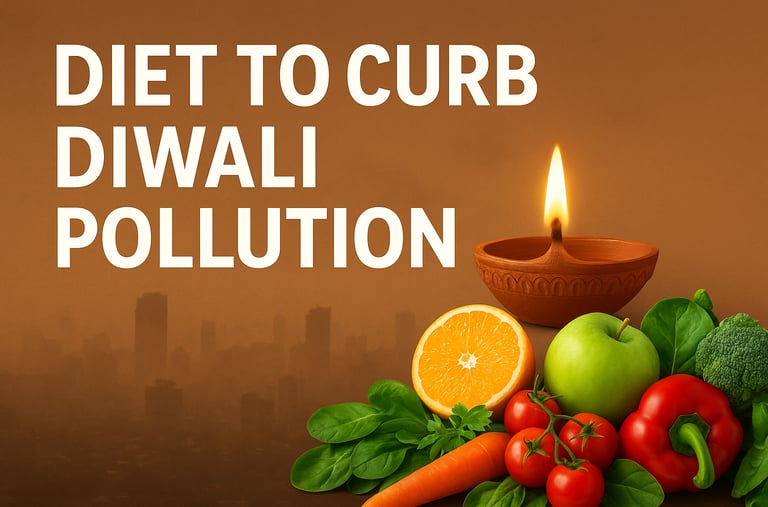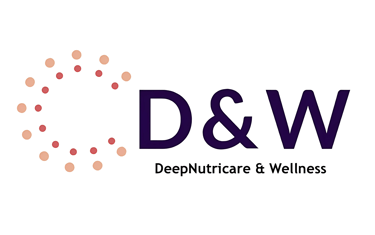How the Right Diet Can Help Your Body Combat Diwali Pollution
Every Diwali, India faces severe air pollution that affects breathing, skin, and overall health. This blog by DeepNutricare & Wellness explores how a balanced, antioxidant-rich diet can help the body combat the harmful effects of pollution. From detoxifying drinks and vitamin-packed foods to lung-supportive nutrients, it offers practical dietary strategies to strengthen immunity and promote holistic wellness during the festive season.
OVERALL HEALTH AND WELLNESS
10/20/20254 min read


By DeepNutricare & Wellness
Every year, as the festive lights of Diwali illuminate homes across India, another reality dims the joy — rising air pollution levels. The post-Diwali smog, heavy with particulate matter and toxic gases, blankets cities, making the air dense and often unbreathable. For families, especially children and the elderly, this season brings not just celebrations but also coughs, allergies, headaches, and breathing difficulties.
While we cannot eliminate pollution overnight, we can strengthen our body’s defence system from within. Nutrition plays a powerful role in countering the oxidative stress and inflammation caused by polluted air. A well-designed anti-pollution diet can help your lungs, skin, and immune system cope better with the seasonal toxins.
Let’s understand how.
Understanding How Pollution Affects the Body
Polluted air is loaded with particulate matter (PM2.5 and PM10), nitrogen dioxide, sulfur dioxide, carbon monoxide, and other harmful compounds. When inhaled, these particles enter the lungs and bloodstream, leading to:
Inflammation of the respiratory tract
Oxidative stress, where free radicals damage healthy cells
Reduced oxygen capacity, making you feel tired or foggy
Weakened immunity, leading to frequent coughs, colds, and throat infections
To neutralize these effects, the body needs a steady supply of antioxidants, vitamins, minerals, and hydration. And that’s where diet becomes your strongest ally.
1. Start Your Day with Detoxifying Hydration
Begin each morning by helping your body flush out toxins accumulated overnight.
Warm water with lemon and turmeric: Lemon provides vitamin C, while turmeric’s curcumin compound has strong anti-inflammatory and antioxidant properties.
Tulsi (Holy Basil) and ginger tea: Both herbs support respiratory health and strengthen the immune system.
Coconut water: A natural electrolyte drink that helps maintain hydration and supports liver detoxification.
Pro tip: Avoid starting your day with tea or coffee on an empty stomach — they can increase acidity and slow detoxification.
2. Fill Your Plate with Antioxidant-Rich Foods
Antioxidants fight the free radicals generated by pollution exposure. The more colour on your plate, the better your body’s defence.
Include:
Citrus fruits like oranges, amla, guava, and lemons for vitamin C.
Berries, apples, and pomegranates for flavonoids and polyphenols.
Green leafy vegetables like spinach, kale, and methi for chlorophyll and iron.
Bright vegetables like carrots, pumpkin, and bell peppers for beta-carotene and vitamin A — crucial for lung lining protection.
Tip: Amla (Indian gooseberry) is a powerful antioxidant. A small portion daily — raw, as juice, or as chutney — helps boost respiratory immunity.
3. Strengthen Lungs with Anti-Inflammatory Foods
Inflammation of the airways is one of the most damaging effects of pollution. Certain foods can help soothe the respiratory system:
Turmeric milk (Haldi doodh) at night: Curcumin fights inflammation and supports detoxification.
Garlic and onions: Contain sulfur compounds that enhance lung cleansing and fight infections.
Ginger: Relieves throat irritation and helps clear mucus buildup.
Flaxseeds and walnuts: Rich in omega-3 fatty acids that reduce inflammation and improve lung function.
Pro tip: Replace refined oils with cold-pressed mustard or olive oil to support healthy lipid metabolism.
4. Support Your Liver — The Body’s Detox Center
Your liver works overtime during the pollution-heavy season, filtering out toxins absorbed through food, air, and skin. Help it function efficiently with nutrient-dense, unprocessed foods.
Include:
Cruciferous vegetables like broccoli, cabbage, and cauliflower — they boost liver enzymes.
Beetroot and carrots — rich in betaine and carotenoids that aid detoxification.
Herbal aids like milk thistle, turmeric, and dandelion tea (optional) — known for liver-protective properties.
Avoid:
Deep-fried snacks, excess sweets, and processed foods that burden the liver.
Alcohol and aerated drinks that dehydrate the body and reduce detox capacity.
5. Protect Your Skin from Pollutant Damage
Pollution doesn’t just harm your lungs — it also dulls your skin and accelerates aging by breaking down collagen. Diets rich in antioxidants and hydration can help restore glow.
Vitamin E sources: Nuts, seeds, and avocados prevent dryness and oxidative damage.
Beta-carotene foods: Carrots, papaya, and sweet potatoes support skin repair.
Hydrating foods: Cucumber, watermelon, oranges, and soups help maintain skin elasticity.
Pro tip: Add a teaspoon of ghee to your meals — it supports skin moisture and acts as a natural detoxifier in Ayurveda.
6. Keep Immunity Strong
Pollution weakens the body’s defence against infections. To prevent frequent colds, sore throats, and fatigue, focus on immune-boosting nutrients:
Vitamin C: Amla, guava, citrus fruits
Zinc: Pumpkin seeds, sesame seeds, legumes
Vitamin D: Morning sunlight or supplements if deficient
Probiotics: Curd, buttermilk, fermented foods for gut health
Avoid: Excess sugar, processed snacks, and bakery items — they spike inflammation and lower immune response.
7. Don’t Forget Hydration and Herbal Support
Water is your body’s simplest detox tool. Pollution dries out the respiratory tract, so hydration keeps mucus thin and helps expel particles.
Drink 2.5–3 litres of water daily
Include herbal infusions like tulsi, giloy, or lemongrass tea
Consume soups and broths to stay nourished and hydrated simultaneously
8. Smart Festive Eating Tips During Diwali
Diwali festivities often mean indulgence — sweets, fried snacks, and late-night celebrations. Enjoy them, but wisely:
Balance rich foods with lighter meals — include soups, fruits, and salads during the day.
Avoid mixing alcohol and sweets — both create inflammation and stress the liver.
After heavy meals, sip warm water with a pinch of ajwain or saunf to aid digestion.
Ensure adequate sleep and hydration to support body repair overnight.
For a free 3-day Post-Diwali Detox Diet Plan, contact us at 📞 9205232987 or email us at 📩 dnutricare@gmail.com to restore your energy, cleanse naturally, and get back on track with balanced wellness!
The Takeaway
Diwali brings light, togetherness, and joy — but it also challenges our health with high pollution levels. By consciously choosing anti-inflammatory, antioxidant, and detoxifying foods, you can help your body resist and recover from pollution stress.
Let this festival remind us that true celebration lies not only in lighting diyas outside but also in nurturing the inner light of health and vitality.
May your Diwali be filled with good food, clean air, and glowing well-being. 🌟
– DeepNutricare & Wellness
“Nourish Deeply, Live Fully.”
DeepNutricare & Wellness
Your Trusted Health Partner
dnutricare@gmail.com
9205232987
© 2025. All rights reserved.
Follow Us
Policies
Contact us:
Get in Touch
Quick Links
